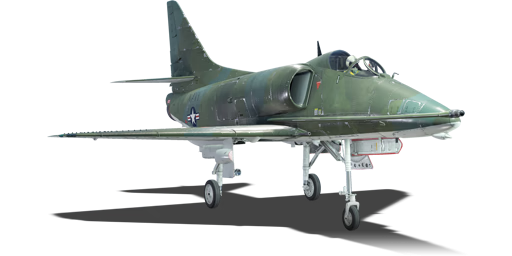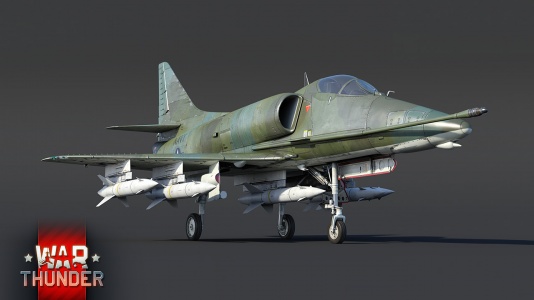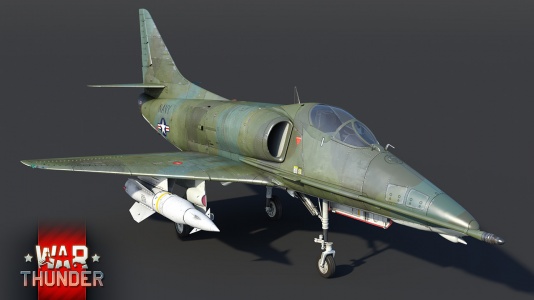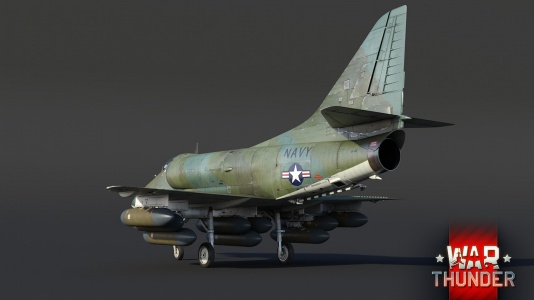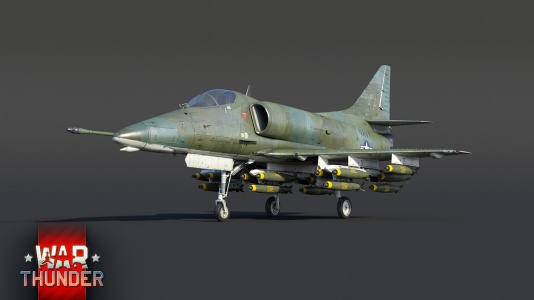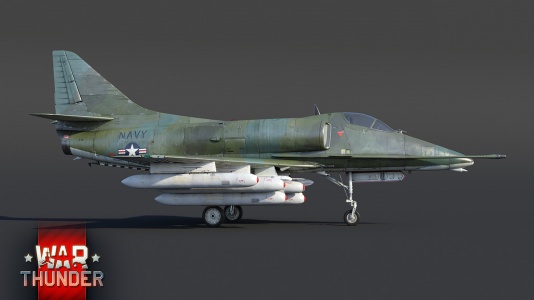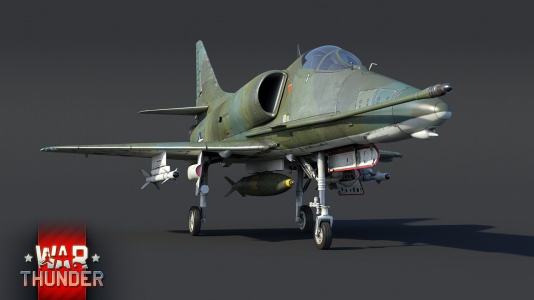A-4E Early
Contents
Description
The A-4E Skyhawk Early is a squadron rank VI American jet attacker with a battle rating of 9.0 (AB), 8.7 (RB), and 9.3 (SB). It was introduced during Update "New Power".
General info
Flight performance
The A-4E behaves like the A-4B, with excellent manoeuvrability at speed, aided by the automatic wing slats. However, the aircraft bleeds speed rapidly during extended turns, and will drop down to about 320 km/h (200 mph) after more than a 90 degree turn. Overall, it can turn with G.91s and MiG-15s without issue, however extended dogfights should be avoided. If uptiered, flight performance leaves much to be desired, it can be outmanoeuvred even by the Yak-38 or F-104 in a dogfight. Also, if playing at 9.7, you will face the Harrier GR.1 with SRAAM's, and if one gets on your tail, you will be quickly killed.
| Characteristics | Max Speed (km/h at 0 m - sea level) |
Max altitude (metres) |
Turn time (seconds) |
Rate of climb (metres/second) |
Take-off run (metres) | |||
|---|---|---|---|---|---|---|---|---|
| AB | RB | AB | RB | AB | RB | |||
| Stock | 1,066 | 1,057 | 12500 | 37.9 | 39.0 | 29.5 | 26.7 | 900 |
| Upgraded | ___ | ___ | __._ | __._ | __._ | __._ | ||
Details
| Features | |||||
|---|---|---|---|---|---|
| Combat flaps | Take-off flaps | Landing flaps | Air brakes | Arrestor gear | Drogue chute |
| ✓ | ✓ | ✓ | ✓ | ✓ | X |
| Limits | ||||||
|---|---|---|---|---|---|---|
| Wings (km/h) | Gear (km/h) | Flaps (km/h) | Max Static G | |||
| Combat | Take-off | Landing | + | - | ||
| 1167 | 437 | 615 | 615 | 410 | ~8 | ~2 |
| Optimal velocities (km/h) | |||
|---|---|---|---|
| Ailerons | Rudder | Elevators | Radiator |
| < 450 | < 700 | < 490 | N/A |
Engine performance
| Engine | Aircraft mass | ||||||
|---|---|---|---|---|---|---|---|
| Engine name | Number | Basic Mass | Wing loading (full fuel) | ||||
| Pratt & Whitney J52-P-64A | 1 | 4,679 kg | 296 kg/m2 | ||||
| Engine characteristics | Mass with fuel (no weapons load) | Max Takeoff Weight | |||||
| Weight (each) | Type | 12m fuel | 20m fuel | 30m fuel | 40m fuel | ||
| 900 kg | Axial-flow turbojet | 5,419 kg | 5,913 kg | 6,530 kg | 7,147 kg | 11,113 kg | |
| Maximum engine thrust @ 0 m (RB / SB) | Thrust to weight ratio @ 0 m (100%) | ||||||
| Condition | 100% | WEP | 12m fuel | 20m fuel | 30m fuel | 40m fuel | MTOW |
| Stationary | 3,470 kgf | N/A | 0.64 | 0.59 | 0.53 | 0.49 | 0.31 |
| Optimal | 3,470 kgf (0 km/h) |
N/A | 0.64 | 0.59 | 0.53 | 0.49 | 0.31 |
Survivability and armour
- 2.54 mm steel surrounding bottom half of the pilot
- 50 mm bulletproof glass in front of the cockpit
The front half of the plane holds the pilot and a self-sealing fuel tank. The wings hold non self-sealing fuel tanks, and the back half of the plane holds the engine.
One single well-placed round from an ADEN cannon can completely cripple the plane by taking out the pilot or an engine. It is completely open to attack from the side and front although it can be armed with flares. Overall, survivability is quite poor, the best armour is to not get hit.
Armaments
Offensive armament
The A-4E Early is armed with:
- 2 x 20 mm Browning-Colt Mk12 Mod 3 cannons, wing-mounted (100 rpg = 200 total)
Suspended armament
The A-4E Early can be outfitted with the following ordnance:
- Without load
- 3 x 20 mm Mk 11 mod 5 cannons (750 rpg = 2,250 total)
- 20 x 250 lb LDGP Mk 81 bombs (5,000 lb total)
- 14 x 500 lb LDGP Mk 82 bombs (7,000 lb total)
- 3 x 750 lb M117 cone 45 bombs (2,250 lb total)
- 1 x 750 lb M117 cone 45 bomb (750 lb total) + 114 x FFAR Mighty Mouse rockets
- 1 x 750 lb M117 cone 45 bomb (750 lb total) + 24 x Zuni Mk32 Mod 0 ATAP rockets
- 1 x 750 lb M117 cone 45 bomb (750 lb total) + 4 x AGM-12B Bullpup missiles
- 1 x 750 lb M117 cone 45 bomb (750 lb total) + 2 x AIM-9B Sidewinder missiles
- 5 x 1,000 lb LDGP Mk 83 bombs (5,000 lb total)
- 1 x 2,000 lb LDGP Mk 84 bomb (2,000 lb total)
- 5 x AGM-12B Bullpup missiles
- 2 x AGM-12C Bullpup missiles
- 171 x FFAR Mighty Mouse rockets
- 36 x Zuni Mk32 Mod 0 ATAP rockets
- 2 x AIM-9B Sidewinder missiles
- 114 x FFAR Mighty Mouse rockets + 6 x 250 lb LDGP Mk 81 bombs (1,500 lb total)
- 114 x FFAR Mighty Mouse rockets + 6 x 500 lb LDGP Mk 82 bombs (3,000 lb total)
- 24 x Zuni Mk32 Mod 0 ATAP rockets + 6 x 250 lb LDGP Mk 81 bombs (1,500 lb total)
- 24 x Zuni Mk32 Mod 0 ATAP rockets + 6 x 500 lb LDGP Mk 82 bombs (3,000 lb total)
- 2 x AGM-12B Bullpup missiles + 133 x FFAR Mighty Mouse rockets
- 2 x AGM-12B Bullpup missiles + 28 x Zuni Mk32 Mod 0 ATAP rockets
- 2 x AGM-12B Bullpup missiles + 18 x 250 lb LDGP Mk 81 bombs (4,500 lb total)
- 2 x AGM-12B Bullpup missiles + 12 x 500 lb LDGP Mk 82 bombs (6,000 lb total)
- 2 x AGM-12B Bullpup missiles + 3 x 1,000 lb LDGP Mk 83 bombs (3,000 lb total)
- 2 x AIM-9B Sidewinder missiles + 8 x 250 lb LDGP Mk 81 bombs (2,000 lb total)
- 2 x AIM-9B Sidewinder missiles + 8 x 500 lb LDGP Mk 82 bombs (4,000 lb total)
- 2 x AIM-9B Sidewinder missiles + 3 x 1,000 lb LDGP Mk 83 bombs (3,000 lb total)
- 2 x AIM-9B Sidewinder missiles + 1 x 2,000 lb LDGP Mk 84 bomb (2,000 lb total)
- 2 x AIM-9B Sidewinder missiles + 3 x AGM-12B Bullpup missiles
- 2 x AIM-9B Sidewinder missiles + 95 x FFAR Mighty Mouse rockets
- 2 x AIM-9B Sidewinder missiles + 20 x Zuni Mk32 Mod 0 ATAP rockets
- 2 x AIM-9B Sidewinder missiles + 1 x 20 mm Mk 11 mod 5 cannon (750 rpg)
Usage in battles
In Air Realistic battles, one can take any combination of 3 paths due to the wide array of armament. First, one can use the attacker air spawn to your advantage with either the 2 AIM-9B Sidewinders, the 2 AIM-9Bs and the 20 mm gunpod, or a triple gunpod array. Use the air spawn to climb to anywhere between 1,000 and 5,000 meters, and either catch fighters trying to climb, or pounce on the low flying Vautour bombers common at this BR. However, if uptiered, especially versus Britain with the Harrier GR.1, this is not a good option, as you cannot climb with them, and they will bounce you. If this is the case, take either FFAR rocket pods or AGM-12 Bullpups or the Zuni pods and take out ground targets. The last option is to use the wide array of bombs, preferably the 14 x 500 lb loadout, and take out either 1 or 2 bases with them. Then, return to base and optionally respawn with AIM-9s and pick off damaged enemies.
In Ground RB, the only loadouts worth taking are the Zuni or FFAR pods, or better yet, the 5 x AGM-12B Bullpup loadout. These missiles, with practice, can kill everything from 8.0 to 10.7. They are basically a precision 250 lb bomb that is guided to the target. The A-4E is basically a complete line-up with the XM-803, MBT-70, XM-1 GM, or the HSTV-L.
Modules
| Tier | Flight performance | Survivability | Weaponry | |||
|---|---|---|---|---|---|---|
| I | Fuselage repair | Compressor | Flares | Mk81 | AGM-12B Bullpup | |
| II | New boosters | Airframe | Offensive 20 mm | Mk82 | LAU-3/A | |
| III | Wings repair | Engine | New 20 mm cannons | Mk83 | LAU-10/A | |
| IV | G-suit | Cover | Gun pod Mk 4 Mod 0 | Mk84 | AIM-9B | |
Pros and cons
Pros:
- Can be armed with 5 AGM-12B Bullpup missiles
- Has loadouts with AIM-9B Sidewinder missiles to either defend itself or play the role of a fighter
- Researchable flares are a good counter to IR guided missiles it may face at its BR
- AGM-12B Bullpup is a tier I modification
- Can use its airspawn to help play the role of a fighter
Cons:
- Subsonic
- Mediocre climb rate compared to planes it can face
- Gun pods and AIM-9B Sidewinder missiles are tier IV modifications
History
The A4D-5 Skyhawk was an improved model of the A4D-2N (designated A-4C in 1962). The main improvement came in the form of the more powerful Pratt & Whitney J52-P-6A engine, producing 8,400 pounds of thrust. In addition to the new powerplant, the A4D-5 also received two more wing-mounted stores pylons, for a total of five. The avionics were also improved, including a new TACAN system and a toss-bombing computer. Later in their service life, many A-4E Skyhawks were upgraded with the fuselage avionics pod J52-P-8 engine (with 9,300 pounds of thrust) from the A-4F.
The A4D-5 first flew in July 1961, and was renamed to A-4E in 1962 after the Tri-Service Aircraft Designation System came into effect. The A-4E entered production in December of 1962; a total of 499 A-4E Skyhawks would be delivered to the US Navy and Marine Corps starting in January 1963.
The A-4E began to see combat in Vietnam after arriving in early 1965, but it did not fully replace the earlier Skyhawks such as the A-4C. After opening in June 1965, the Chu Lai Short Airfield for Tactical Support (SATS) housed Marine A-4E Skyhawks. The Skyhawks landed using arrestor wires and took off by rocket-assisted takeoff (RATO). Throughout the Vietnam War, A-4 Skyhawks were used to provide close air support (CAS) for Marine Corps ground forces, primarily using bombs and rockets. A total of 362 A-4s of all types were lost during the Vietnam War, including non combat losses. 271 were from the US Navy, and 91 were from the Marine Corps.
During the war, many A-4Es and A-4Fs were used in the United States for training purposes. They had their armament - including external stores - removed and their slats fixed, and were used as aggressors (where they would act as enemy aircraft for training). In the aggressor role, an A-4 was called 'Mongoose'.
- 1965 Philippine Sea Incident
It was December 5, 1965. This was the time of the Cold War and Vietnam War. Sailing 70 miles from the nearest island, 200 miles from Okinawa, was the USS Ticonderoga, carrying Attack Squadron 56 (VA-56) consisting of A-4E attack jets that were carrying nuclear bombs. Lieutenant (Junior Grade) Douglas M. Webster, pilot of Douglas A-4E BuNo 151022 was performing a training exercise in his jet, rolling from hangar 2 to elevator 2. The jet was carrying a one megaton B43 thermonuclear bomb. An unspecified accident occurred, and the jet rolled off the deck. After a search, neither the pilot, the jet, nor the bomb was ever found, they likely sank the 16,000 ft (4,900 m) to the ocean floor. This was just one of the many "broken arrow" incidents during the Cold War.
The incident was acknowledged in 1981, but was misleading and it was fully revealed in 1989 due to a diplomatic inquiry by Japan. Lt. Cmdr. James Culda said on May 8, 1989 that "the environmental impact is expected to be nil", as the bomb was not armed and poses no threat at 4,900 m under the sea.
Devblog
The beginning of the jet era and the escalation of the Cold War forced the US naval aviation command to look for a replacement for the very successful carrier-based piston-engine AD Skyraider, with the possibility of delivering a tactical nuclear weapon in the area of operation of an aircraft carrier group. With the beginning of the military campaign in Korea, the Douglas Aircraft Company began developing a carrier-based attack aircraft with an unconventional approach - instead of pursuing engine power, usually bringing weight and large size to the aircraft, Ed Heinemann's team concentrated on finding ways to lighten the construction, keeping it under 12,000 lbs.
The projected aircraft was a fairly compact, lightweight jet fighter-attacker with a delta-shaped wing and a competently lightweight design. This is how the A-4A Skyhawk was born, one of the first jet-based carrier-based aircraft capable of carrying a nuclear bomb. The aircraft was distinguished by its simplicity of design, practical controls with excellent flight characteristics for its time. Soon, in 1956, the A-4B version appeared, capable of carrying a huge variety of mounted weapons on three suspension points, including guided missiles.
Thus, "Skyhawk" had become a truly universal carrier-based aircraft, capable of solving the entire spectrum of tasks for US Naval Aviation. A rather noticeable drawback of the attack aircraft was still the limited range of action, also army types always wanted to increase the weapon load. In 1961, Douglas presented an improved version of the aircraft with five pylons for armament and a new engine, which compensated for a heavier combat load, and also increased the range of the attack aircraft. It was the A-4E that became one of the most massive Skyhawk modifications and formed the image of a modern carrier-based attack aircraft. The "E" version was actively involved in the Vietnam War, and later, up till the end of the 80's, was used to simulate enemy aircraft in training dogfights.
Media
- A-4E Early Devblog Images
See also
- Related development
External links
Bibliography
- A-4E Skyhawk: Pacific Coast Air Museum: Navy Attack Plane. (2019, December 17). Retrieved December 12, 2020, from https://pacificcoastairmuseum.org/aircraft/a-4e-skyhawk/
- A-4 Skyhawk Production. (n.d.). Retrieved December 12, 2020, from http://skyhawk.org/content/douglas-4-skyhawk-production-history
- Standard Aircraft Characteristics Navy Model A-4E Aircraft. (n.d.). Retrieved from http://www.alternatewars.com/SAC/A-4E_Skyhawk_SAC_-_1_July_1967.pdf
| USA jet aircraft | |
|---|---|
| Fighters | |
| F-4 | F-4C Phantom II · F-4E Phantom II · F-4J Phantom II · F-4S Phantom II |
| F-5 | F-5A · F-5C · F-5E · F-20A |
| F-8 | F8U-2 · F-8E |
| F-80 | F-80A-5 · F-80C-10 |
| F-84 | F-84B-26 · F-84F · F-84G-21-RE |
| F-86 | F-86A-5 · F-86F-25 · F-86F-2 · F-86F-35 |
| F-89 | F-89B · F-89D |
| F-100 | F-100D |
| F-104 | F-104A · F-104C |
| F-14 | F-14A Early · F-14B |
| F-15 | F-15A |
| F-16 | F-16A · F-16A ADF · F-16C |
| F9F | F9F-2 · F9F-5 · F9F-8 |
| Other | P-59A · F2H-2 · F3D-1 · F3H-2 · F4D-1 · F11F-1 |
| Strike Aircraft | |
| FJ-4 | FJ-4B · FJ-4B VMF-232 |
| A-4 | A-4B · A-4E Early |
| A-6 | A-6E TRAM |
| A-7 | A-7D · A-7E · A-7K |
| AV-8 | AV-8A · AV-8C |
| A-10 | A-10A · A-10A Late |
| B-57 | B-57A · B-57B |
| F-105 | F-105D |
| F-111 | F-111A |
| Squadron aircraft | |
|---|---|
| USA | A-4E Early |
| Germany | Me 262 A-1a/U1 · ◌Hunter F.58 |
| USSR | Su-22M3 |
| Britain | Firecrest · Sea Harrier FRS.1 |
| Japan | ▄F-5E FCU |


